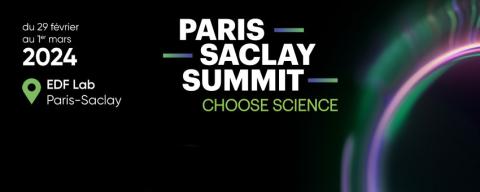
Paris-Saclay Summit 2024 - choose science
Place science at the heart of our society and demonstrate the critical role that science has to play in tackling the major challenges of the 21st century; these are the objectives of the first edition of the Paris-Saclay Summit which will take place from 29 February to 1 March at EDF Lab Paris-Saclay (7 boulevard Gaspard Monge à Palaiseau).
Under the high patronage of the President of the French Republic, Emmanuel Macron, the summit, which is being organised by the Paris-Saclay conurbation authority, Le Point, the Île-de-France region, and supported by the Essonne department, in partnership with Université Paris-Saclay, will bring together scientists, inventors, citizens, politicians, students and entrepreneurs. Approximately fifty conferences and meetings will give centre stage to leading scientists, including experts from Université Paris-Saclay.
The event will draw on Paris-Saclay’s scientific and technological reputation to promote the excellence and international acclaim of public and private research in France.
Over the two days, the Paris-Saclay Summit – choose science event will give participants the chance to:
- Learn about the latest scientific breakthroughs
- Take part in conferences and debates on top subjects, ranging from health, artificial intelligence, energy, climate, ecology, food, innovation and quantum science
- Meet inventors, Nobel Prize winners, politicians, business leaders
- Find out who are the winners of the Le Point Inventors’ Award.
The programme (partial list)
Here a few of the conferences with speakers from Université Paris-Saclay (you can find the full programme on the Le Point website)
- “Universities and research organisations: from research to innovation for society”, with Jean-Luc Moullet, CNRS Deputy Director General for Innovation, and Estelle Iacona, President of Université Paris-Saclay
- “Artificial intelligence: should we be afraid of the ghost in the machine?”, with Nicolas Sabouret, professor of computer science at Université Paris-Saclay, lecturer at CentraleSupélec, Director of the Graduate School of Computer Science at Université Paris-Saclay, and Alexei Grinbaum, CEA Research Director at the Research Laboratory for matter science and Chairman of the CEA’s Digital Ethics Steering Committee
- “Will we be able to cure all cancers in the future?”, with Sandra Oucher, Vice-President of World Education Heritage, expert in nanomedicine and immuno-oncology, and Fanny Jaulin, Inserm research director at Institut Gustave Roussy, researcher at the Tumour Cell Dynamics Laboratory (TCD - Université Paris-Saclay, Gustave Roussy, Inserm)
- “The huge promises of the universe”, with Nathalie Cabrol, astrobiologist (via videoconference), Jean-Charles Cuillandre, astronomer at CEA Paris-Saclay, member of the Astrophysics Division CEA Saclay (DAp/AIM – Univ. Paris-Saclay, CNRS, CEA, Univ. Paris Cité), Observatory for Sciences of the Universe at Université Paris-Saclay, member of the Euclid mission, and Caroline Freissinet, astrochemist, CNRS researcher at the LATMOS laboratory
- “Interview with Nobel Prize winner Pierre Agostini”, with Pierre Agostini, French physicist, co-laureate of the Nobel Prize in Physics 2023
- “Will the hydrogen revolution fizzle out?”, with Laurent Catoire, Director of the UCP chemistry and processes unit, ENSTA Paris, Institut Polytechnique de Paris, and Bertrand Charmaison, Director of the Institute for Energy Systems Engineering and Economics (I-Tésé – Univ. Paris-Saclay, CEA)
- “The epic of melanoma treatments”, with Caroline Robert, professor at the Faculty of Medicine at Université Paris-Saclay, Head of Dermatology at the Institut Gustave Roussy, international melanoma expert.
Here a few of the conferences with speakers from Université Paris-Saclay (you can find the full programme on the Le Point website)
- “Major world firsts supported by the Université Paris-Saclay Foundation”, with Patrick Duvaut, Vice-President at Université Paris-Saclay for the Université Paris-Saclay Foundation
- “Chance, hard work, genius: where do the great scientific breakthroughs come from?”, with Alain Aspect, winner of the Nobel Prize in Physics 2022, professor at the Institut d’Optique Graduate School – Université Paris-Saclay, professor at École Polytechnique – Institut Polytechnique de Paris, Emeritus CNRS research director, member of the French Academy of Sciences, and Étienne Klein, physicist, CEA research director, director of the Research Laboratory for matter science
- “When science has a nose: an encounter with the mechanism of scent perception”, with Claire de March, chemist, CNRS researcher at the Institute of Chemistry of Natural Substances (ICSN – CNRS/Université Paris-Saclay), winner of the Irène Joliot-Curie “Young Woman Scientist” award 2023
- “What does health data look like, and what can it be used for?”, with Sarah Cohen-Boulakia, professor at Université Paris-Saclay, deputy director of DATAIA, the Artificial Intelligence Institute at Université Paris-Saclay.
- “What kind of food in 2050?”, with Raphaël Haumont, professor, chemist, director of the French Centre for Culinary Innovation at Université Paris-Saclay, and Thierry Marx, chef, director of the French Centre for Culinary Innovation at Université Paris-Saclay
- “How fermentation helps transform our food”, with Damien Paineau, doctor in Human Nutrition, executive director of the Grand Défi Ferments du Futur.
- “AI: disentangling the true from the false to improve public confidence”, with Ari Kouts, innovation consultant at VISEO, and Tina Nikoukhah, researcher at the Centre Borelli (Université Paris-Saclay, CNRS, ENS Paris-Saclay, Université Paris-Cité, Service de santé des armées)
- “Mosquitoes, rats and other such joys: are we going to be invaded by “invasive” species?”, with Franck Courchamp, environmental scientist, CNRS research director at the Ecology, Systematics and Evolution Laboratory (ESE – Univ. Paris-Saclay, CNRS, AgroParisTech)
- ris-Saclay, CNRS, AgroParisTech).
Useful information and registration
29 February and 1 March at EDF Lab Paris-Saclay, 7 boulevard Gaspard Monge, Palaiseau. Entry is free of charge but registration is required. A free shuttle service will be provided.
